A family affAIr: Three siblings - now U of T grads - use artificial intelligence to make a difference
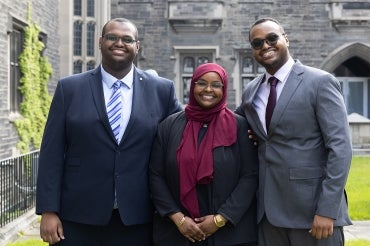
From left: Mogtaba, Rayan and Mouaid Alim have all earned undergraduate degrees from U of T’s department of computer science in the Faculty of Arts & Science (photo by Polina Teif)
Published: June 18, 2025
Three University of Toronto degrees. Individual graduation ceremonies spanning five days. One shared belief in the transformative potential of artificial intelligence.
Rayan, Mouaid and Mogtaba Alim each crossed the stage at Convocation Hall this month during three separate ceremonies (linked to their respective colleges) as they each graduate with honours bachelor’s degrees in computer science.
Raised in Sudan, the United Arab Emirates and the United Kingdom, the three siblings were all accepted into medical school in the U.K. but were drawn to the transformative potential of AI – and to U of T, home to Nobel Prize-winner and “godfather of AI” Geoffrey Hinton, a University Professor emeritus.
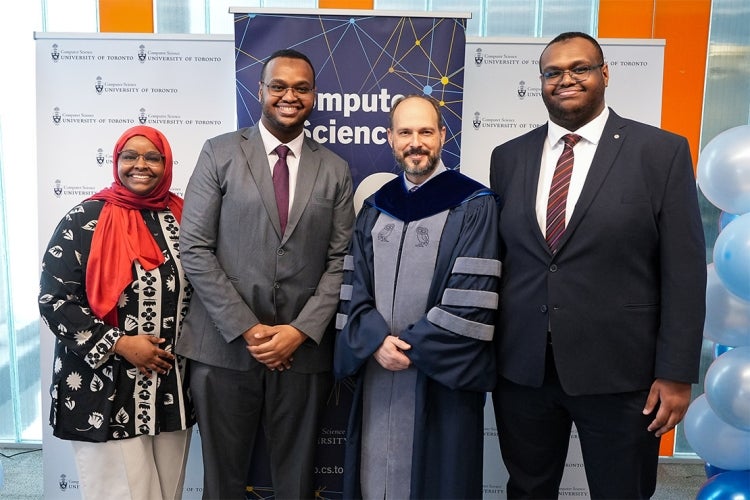
Studying in the bioinformatics and computational biology specialist program, the trio has since conducted research into a range of AI applications – from cancer diagnosis to data governance – launched student groups and even co-founded a startup, earning them each the University of Toronto Student Leadership Award, among other accolades.
U of T News recently spoke with the three siblings about their academic interests, future plans and what it was like to share their undergraduate journey.
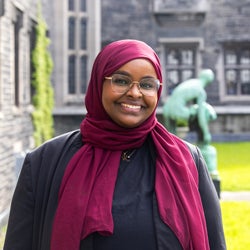
Rayan Alim – St. Michael’s College
Honours bachelor of science – computer science (with a focus in human-computer interaction), major in quantitative biology, minor in statistics and Rotman certificate in business fundamentals
Rayan’s studies explored the intersection of AI, equity and the public good.
She credits U of T’s world-class scholarship across a wide array of subjects and interdisciplinary culture with enabling her work.
“You could go from a machine-learning lab in the morning to a community roundtable in the evening,” she says.
“That proximity to researchers, policymakers, activists and founders – all within a few blocks – pushes you to stop thinking in silos and consider the bigger picture.”
That bigger picture led Rayan to conduct research on climate mobility and data governance at the Toronto Climate Observatory and, as an AI4Good Lab fellow, create a machine-learning tool that uses satellite and census data to project socioeconomic outcomes – work recognized by United Nations Development Programme specialists and validated using education and census data in Nigeria.
She also applied her interest in ethical AI to health care, using bioinformatics and computational tools to examine racial disparities in schizophrenia diagnoses as a researcher at the Centre for Addiction and Mental Health.
At the Vector Institute, Rayan led a capstone project using machine learning to quantify biases in health data, aiming to improve equity and accuracy in clinical decision-making systems.
She also founded the Black STEM Network and the Sudanese Student Union – and served three terms as equity director of the Black Students’ Association and four terms as a board director at the University of Toronto Students' Union.
What was it like attending U of T with her two brothers?
“We’re naturally very competitive people, so being in the same class sometimes would push us all to do better,” she says, “and when you have someone who shares your values and curiosity, it becomes a great support network.”
Up next: A master’s in computer science at U of T, focusing on ethical AI and human-computer interaction.
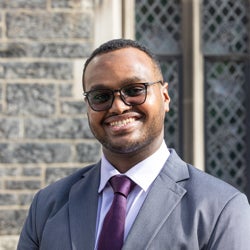
Mouaid Alim – New College
Honours bachelor of science – specialist in bioinformatics and computational biology, double major in computer science and human biology and a Rotman certificate in business fundamentals
With a double major in computer science and human biology, Mouaid worked on several AI-related projects at Toronto General Hospital’s Ajmera Transplant Centre, part of the University Health Network (UHN).
They include: a machine-learning dashboard to optimize liver transplant allocation; AI models to predict changes in the clinical state of potential liver transplant patients; and using large language models (LLMs) to assess patients’ risk of post-transplant injuries and organ rejection. This work has been published in scientific journals such as Gut, which belongs to the British Medical Journal family.
At the Vector Institute, Mouaid completed a capstone project focused on identifying risk factors for heart failure.
“I don’t know what’s in the water or the air here, but I feel like U of T cultivates a culture of collaboration and an ecosystem where people support each other in their path to greatness,” says Mouaid, who served as vice-president of student life at the New College Student Council, a board director at the U of T Students’ Union and president at the Multi-Organ Transplant Insight, Outreach, and Networking Student Chapter, among other roles.
Like his sister, he says the three of them inspire one another.
“If one of us achieves something, it’s like we all achieved it by extension,” he says. “If one of us gains a unique skill set, the others feel like they have it as well. We are constantly teaching and learning from each other.”
Up next: Mouaid has been accepted to the MD program at the Temerty Faculty of Medicine. He also has an offer from the University of Cambridge’s master’s program in health data science.
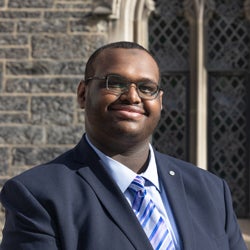
Mogtaba Alim – Trinity College
Honours bachelor of science – double specialist in computer science (with a focus in artificial intelligence) and bioinformatics and computational biology, and a Rotman certificate in business fundamentals
Mogtaba explored his combined passions for AI and health care through research projects at UHN.
These included: developing databases to map gene regulatory networks in cancer at the Krembil Research Institute; and performing large-scale data extraction from computed tomography (CT) scans to support diagnostic and prognostic models at Princess Margaret Cancer Centre.
Drawing on insights from his lab experience, Mogtaba launched LabGPT, a project that uses LLMs to streamline lab onboarding and operations.
He also interned at Amazon Web Services, where he worked on automating data privacy, and at Amazon’s Artificial General Intelligence Lab, where he contributed to LLM development. Of course, he, too, has been an AI researcher at the Vector Institute, focusing on multi-agent reinforcement learning.
Mogtaba, who has served as both vice-president and later president of the U of T Computer Science Student Union, describes the experience of attending U of T with his siblings as “the closest thing to a superpower,” noting that their “intertwined but also independently diverse interests allowed us to learn so much from each other.”
He sees a direct link between their international upbringing and their shared interdisciplinary mindset.
“Growing up with a diversity of experiences – different cultures, beliefs and ways of life – has translated into our diversity of thought,” he says. “This allowed us to think about how anything we do can be translated across borders and be used to break down barriers.”
Up next: Mogtaba has an offer to return to Amazon – and is also collaborating with his siblings on a new business that uses AI voice agents to improve 911 calls and emergency response times.
“We’re building a startup that addresses many of these issues, allowing us to help save lives.”



